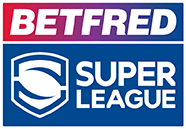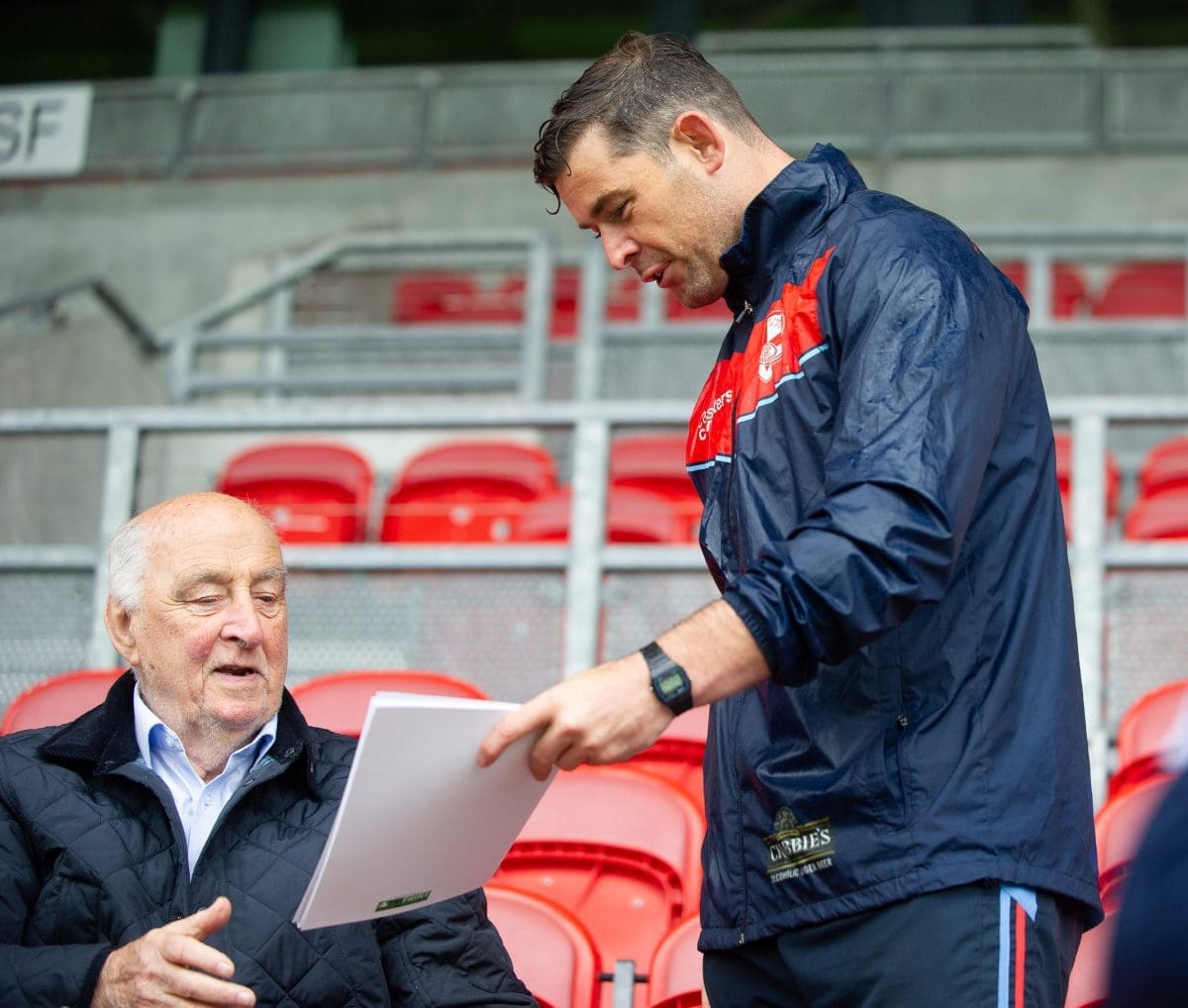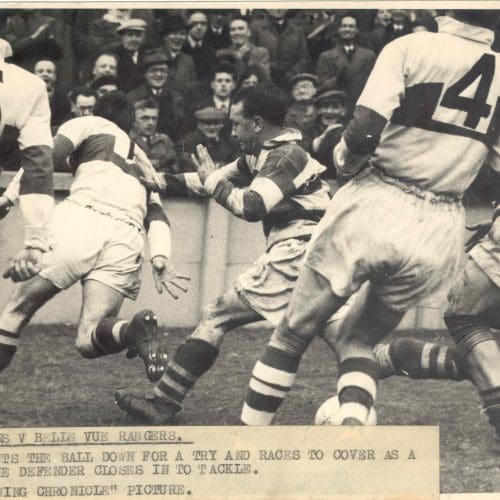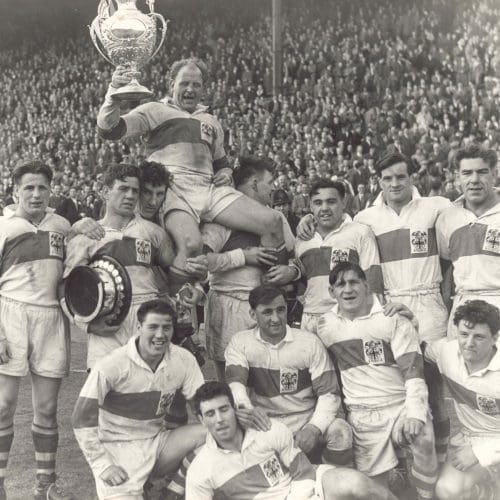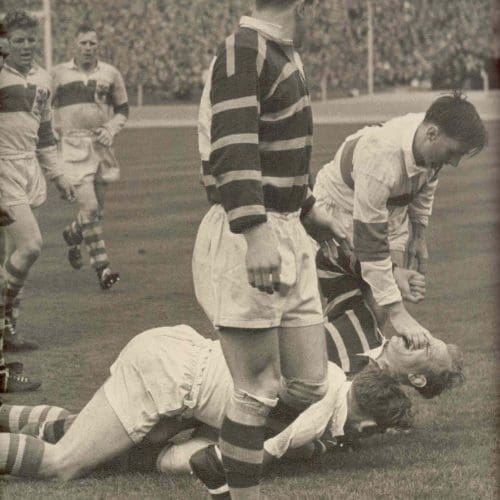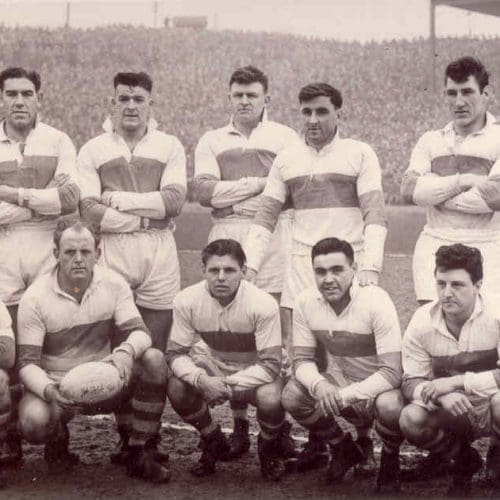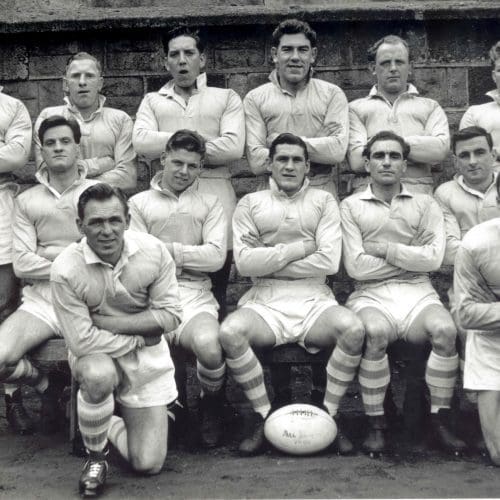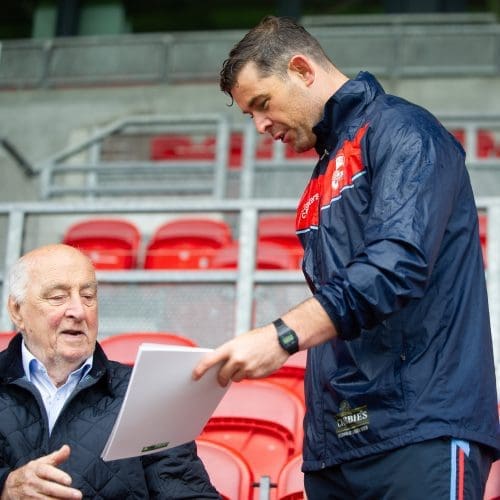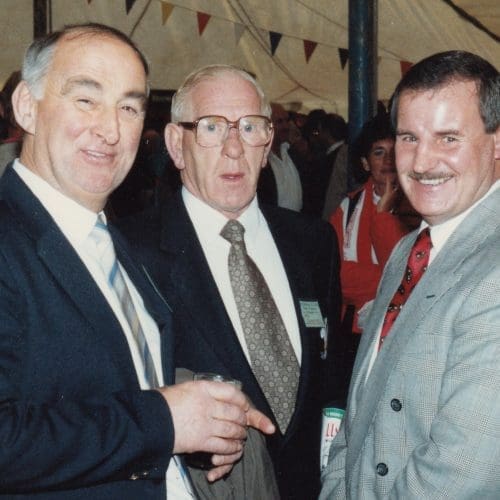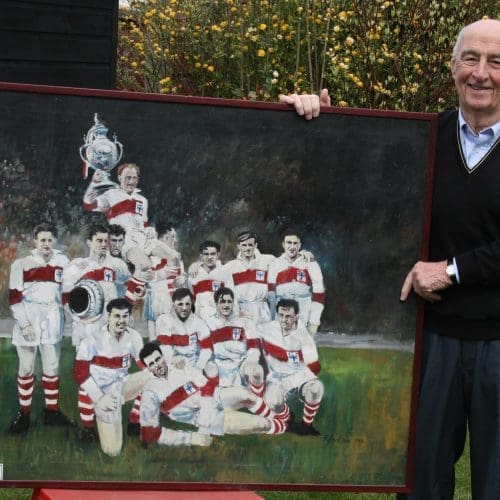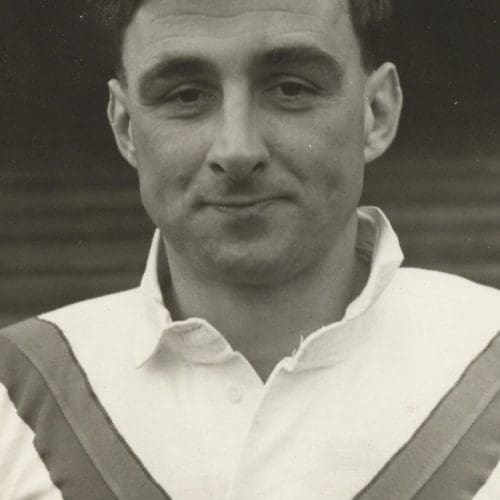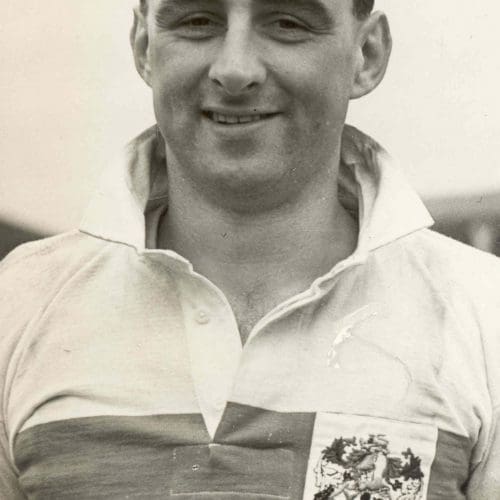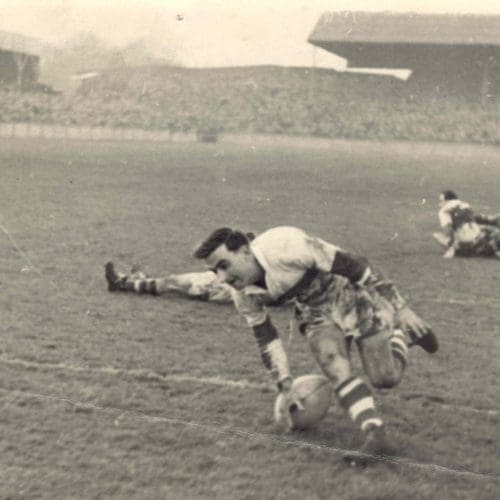It is sad to report the passing of Arthur Glyndwr Moses, popularly known to everyone as Glyn, aged 93. He was the oldest surviving player to have represented St Helens RFC at competitive senior level and the club’s oldest international.
As such he was the last surviving member of Saints’ 1953 Championship winning team and the club’s first-ever Challenge Cup winning team three years later.
A tribute from Saints Heritage Society:
Born: Nant y Moel, Wales 30th May 1928
Died: St Helens 29th September 2021
Saints Heritage Number #712
Down the pit at the age of 14, Glyn originally played rugby union for Newbridge and Maesteg as a promising centre three quarter, just after the war. In November 1949, at the age of 18, he was approached by Salford Secretary-Manager Cyril Braund, who offered the youngster a signing on fee of £600, plus £8 for a win; £6 for a draw and £4 for a defeat.
Why Salford? Glyn’s elder brother, Dai, a fiery forward, had signed for the Red Devils just after the War and went on to become a legend at the Willows, with over 300 games to his name, so it seemed a good thing to do at the time. Glyn was also quite a firebrand in his younger days and was sent off in one derby encounter with local rivals Belle Vue Rangers by referee Laurie Thorpe when he retaliated after being kicked in the shins by Rangers’ forward Doug Phillips. In the dressing room shortly afterwards, he was joined by brother Dai, who decided to get his own back and had also been given his marching orders. The evening paper headlines said it all: ‘Biblical Pair Dismissed.’
Glyn did not enjoy such longevity as Dai at the Willows: “I disagreed with Salford over a house,” he recalled, “I got fed up and just went back home to South Wales during the summer of 1951. Usually Welsh players who went north didn’t return home until they retired from the game. I was still only 21 and I wanted to play rugby, but there was no way back into the union code again!
“It was the point of no return. I played some of the 1951-52 season for the Cardiff Rugby League team, but that all came to an end when Salford claimed that I was one of their registered players. For nigh on 15 months I had been without a game of rugby and it really got me down.”
He had almost given up hope of furthering his rugby career, when, out of the blue, he was asked to phone the Chairman of St Helens RFC, Harry Cook. He was told to come up for a chat and the upshot was that he became a Saint. “There was no glamour to sell me. I was a family man by this time and I knew all about the possible snags of the Northern Game,” he remembered. “Apart from being given the opportunity to play rugby again, they offered to find me a job – there seemed little else but to go down the pit if I stayed in Maesteg.”
The Saints had been building their squad steadily for several years, with several Welshmen in their ranks, such as winger Steve Llewellyn, centre Don Gullick, hooker Reg Blakemore and back rowers Ray Cale and George Parsons, so he would feel quite at home. The coach was another Welshman, Jim Sullivan, who was the main instigator in bringing Glyn back up north. Sullivan, astute as ever, had a different plan for the former centre and Glyn made his debut for the Saints on Christmas Day in the 22-2 victory over Leigh at full-back.
At 5 feet 9 inches and 12 and a half stones, he was strong and mobile, with a superb tackling technique and he could also chime into the threequarter line with real effect. The ‘feel good’ factor of the team generally clearly helped him to establish him in his new role: “Jim Sullivan assured me everything would be fine, but I realised that I was joining a team that was coming to play its best rugby.”
The Saints’ team certainly did come of age in the 1952-53 campaign and arguably Glyn was the final piece of Sully’s team-building jigsaw. He signed his forms on 31st December for his new club and apart from one match, against Wakefield Trinity at Belle Vue, he was ever-present. The team went unbeaten away from home for the entire season, a measure of their new-found dominance.
Top of the table and Lancashire League Champions Saints reached Wembley in confident mood for the Challenge Cup final against Yorkshire rivals Huddersfield. Yet the claret and gold prevailed to win 15-10. Saints never really got going on the day and it was a huge disappointment for the thousands who travelled down to London, not least the now-established Saints’ number one: “We were all down afterwards and things felt really flat, but we had a chance to make up for it a week later when we played them in the Championship semi-final at Knowsley Road and we walloped them 46-0.”
Glyn scored a try that memorable Saturday afternoon as Saints went on to win the Championship itself [the second in their history] on 7th May against Halifax in front of over 50,000 at Manchester City’s Maine Road ground. He scored another three-pointer for good measure, in a 24-14 success, but the star of the show was another Welshman, Reg Blakemore who scored two excellent opportunist touchdowns.
1952-53 was undoubtedly a landmark season for the St Helens club, when they entered the realms of the rugby league elite and Glyn Moses was the rock as last line of defence – and another potent attacking option!
Although the team could not quite repeat their title success in 1953-54, there was another landmark, their first victory against Wigan in a major final – the Lancashire Cup – at a packed Station Road in front of over 42,000 fans. Glyn scored one of the tries, chasing a high kick and touching down expertly, with Livewire scrum-half Jimmy Honey scoring the other. Stand-off Peter Metcalfe booted over 5 goals to complete the 16-8 scoreline. Moses was once again a model of consistency, missing only one game during the campaign. His durability had become a prized asset at Knowsley Road.
The Challenge Cup remained a much-desired prize for the Saints and after two hard-fought semi-final ties against a talented Barrow outfit in 1956, when Moses was at his defensive best, nullifying several threatening attacks, the Twin Towers beckoned. In what had become somewhat of an ‘arm-wrestle’ in modern technology, the Saints suddenly broke the deadlock, when local-born winger Frank Carlton got on the end of a stunning counter attack and the team never looked back, winning 13-2, with skipper Alan Prescott an inspiration on the day and a worthy winner of the coveted Lance Todd trophy. “It was another career highlight for me,” added Glyn, “with thousands waiting to welcome us back home in Victoria Square with the cup – an incredible sight.” It was a marvellous ending to what had been a 59 year wait for such a success in the town, after three previous defeats in the final stage.
His consistency and overall form meant that international representation was a certainty. Glyn made 9 appearances for Great Britain and represented Wales and Other Nationalities on two occasions. His Great Britain debut was against New Zealand on 8th October 1955, when the visitors were convincingly beaten 25-6. One of his most memorable matches was against France at Knowsley Road when he chimed into the threequarter line to score a superb try in the 19th minute as Britain overcame French resistance by 29-14. He was a member of the 1957 World Cup squad in Australia, which also included his team-mates Austin Rhodes and skipper Alan Prescott, when he played in all three of Britain’s matches. Glyn also toured Down Under again in 1958 with the Great Britain team that won the Ashes in sensational fashion, but he didn’t feature in any of the Test matches [Eric Fraser held the full-back spot] and picked up a knee injury that eventually led to his enforced retirement from the game.
Ironically, Jim Sullivan produced another stroke of genius by selecting local lad Austin Rhodes in the full-back position for the Championship semi-final against Oldham at Knowsley Road [a resounding 42-4 victory] who was essentially a half-back. The team came from behind to beat Hunslet in one of the great expositions of open rugby, with the new custodian belting over 10 goals in their 44-22 triumph.
The last of Glyn’s 259 games for the club [including 44 tries] was in a league match against Leeds at Headingley on 28th November 1959, when Saints lost 11-24. Glyn was well-respected throughout the game and once was penned a series of articles for the St Helens edition of the Evening Chronicle. He was a real fans’ favourite at Knowsley Road too. Those privileged to watch him recall his superb defensive attributes and the way in which he would use his shoulder to deadly effect to send attackers flying unceremoniously over the touchline. Few got the better of him, although he remembered one nightmare scenario when he was one on one with Brian Bevan. “He was such a freakish player and you just didn’t know what he was going to do. In the end I just held my hands up in total exasperation. I wasn’t the first and certainly not the last to experience his un-canny ability and come out second best.”
He remained a St Helens resident and is one of eight Welshmen who have been inducted into the prestigious Saints’ Player’s Association Hall of Fame, including former coach Jim Sullivan, the man who gave him a second chance for glory. A driver for St Helens Corporation, Glyn will also be remembered as the popular Steward of the Windle Bowling Club for many years.
It seemed quite fitting that another legendary Saints’ full-back, Paul Wellens, should present him with his Heritage Number Certificate on 14th August 2019, after Glyn had watched the Saints go through their paces before the following day’s clash against Leeds Rhinos at Headingley. He will be remembered as the first great post-war number one at Knowsley Road and the start of a tradition that has included such luminaries as Austin Rhodes, Geoff Pimblett, Steve Prescott and Wellens himself, who, of course, was converted from an aspiring half-back to the full-back berth. What goes around comes around, as they say.
Glyn always managed to stay physically fit for most of his life, but recently, dementia had taken a heavy toll. He was a real Saints’ legend, with a truly wicked sense of humour and everyone at St Helens RFC send their condolences to Glyn’s family and his many friends at this sad time.

